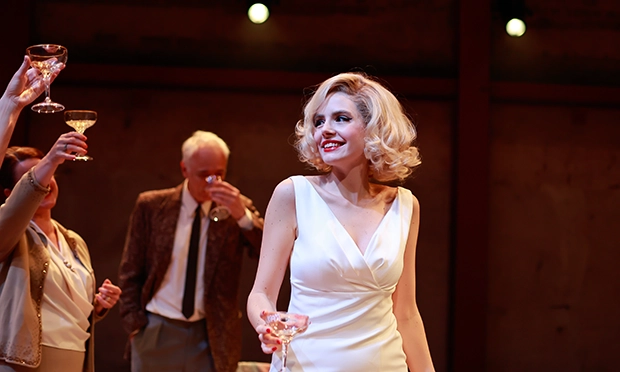The Marilyn Conspiracy, Park Theatre, stage review: ‘The murky world of make-believe’

Genevieve Gaunt as Mariln Monroe. Photograph: NUX Photography
True crime meets kitchen sink and oh-so-Hollywood in The Marilyn Conspiracy at the Park Theatre.
Writer and originator Vicki McKellar and director Guy Masterson have teamed up for a ghoulish imagination exercise around the death of peroxide blonde legend Marilyn Monroe.
The date is 1962 and Monroe is reeling from a flop with The Misfits, a legal dispute with Fox over illness, and an unfulfilled contract for Something’s Got to Give.
The star is also battling substance abuse and mental and physical instability – all in the full glare of the media and public.
What followed has been the focus of almost a dozen books, an inquest (naturally) and a 1982 case review by the police.
Writers such as Norman Mailer have cut their teeth on the salacious and politically incendiary nature of Monroe’s relationships with one or both of the Kennedy Brothers, her ex-husband and Communist sympathiser Arthur Miller, and mobster Sam Giancana.
There are also countless films about her drug dependency and vulnerability – the most recent being the harrowing Blonde in 2022.
Everyone has an opinion, and everyone is happy to make a buck off the enigmatic actress, living or dead.
‘Do we need another?’ I cry, weakly.
Apparently so. But how does this recent incarnation live up to the many, many depictions of Monroe jostling for attention?
Costume designer Sarah June Mills clads the unhappy pseudo-family around Monroe in these last imagined hours in the clipped suits, tight skirts and flowing dresses of the early 60s.
Monroe’s bouncing blonde hair and skin-tight white dress make Genevieve Gaunt, the actor playing her, looks every inch the star.
The setting is Monroe’s Los Angeles home, with its snake plants and low coffee tables.
However, a spinning centre circle means the audience spends much of the show staring at a lot of hard-working but still rather uninteresting backs.
Arguments are battled inwards, face to face, and viewers are excluded from the tense negotiations as the cast slowly pirouette like well-dressed rotisserie chickens.
Gaunt has an inexpressibly difficult task (although I’ll try), considering Monroe was essentially a character played by Norma Jeane Mortensen – a master of self-publication and a precursor to today’s celebrity.
As Mortensen once said: “I never wanted to be Marilyn—it just happened. Marilyn’s like a veil I wear over Norma Jeane.”
Gaunt struggles with that complexity but tentatively comes out on top, bringing a nervous flighty energy with veins of steely strength. And there’s not too much of the purring sex symbol or the ditzy blonde.
The actor stumbling over lines at points but ultimately gives a well-rounded look at a most distinctive woman.
Sally Mortemore as housekeeper Ms Murray has a quiet dignity, and David Calvitto as ‘Psychy’ (Monroe’s psychiatrist) keeps the group scenes from spilling off into chaos.
Masterson’s direction allows the scene succeeding Monroe’s death to occasionally flash with tense bartering, each character coming at it from a different angle and agenda.
One cigarette is smoked throughout the whole piece. The 1960s without smoking is like the 2020s without climate change.
Sadly, the final act feels like a slog. Round and round goes the spinning stage and the repetitive bashing of paper cutout characters. It’s less a bullfight and more a greyhound race with no end or beginning.
As a super fan myself, this “well-researched” piece gives air to the most salacious, unfounded and frankly gruesome hypotheses thrown about by every writer with a career to build since the 1960s.
Dangerously, although it has the word conspiracy in the title, it is marketed as truth.
Unlike true crime’s pragmatic discussion of every possible theory, this is a theatrical approach and gives flesh to just one narrative.
I question the morality of taking such a course, and along with the script, staging and acting inconsistencies, wonder why we are treated to another shock factor tale of this tragic event.
Why not instead revel in her understated humour in The Seven Year Itch or her dribbling venom in Niagara? Or, if you must, tackle the sad poignancy and acting ability in her last film, The Misfits?
Watch Marilyn in her element, how she would like to be remembered, as “wonderful” (her word), not this tawdry depiction that spins off lazily into the murky world of make-believe.
The Marilyn Conspiracy runs until 27 July at the Park Theatre.
